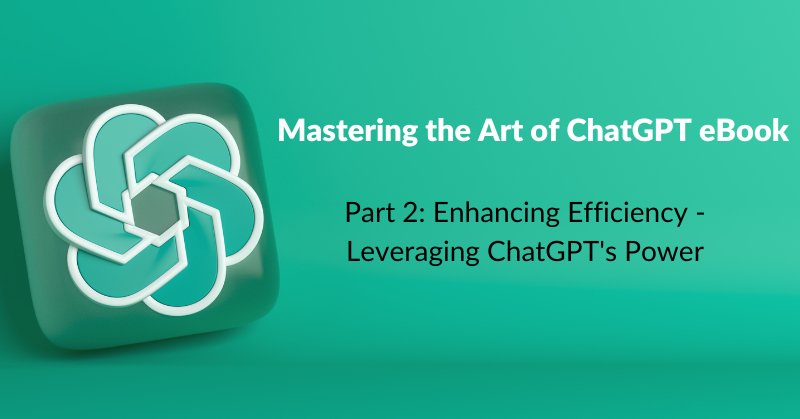This is part 2 in our 7-part series designed to help you master ChatGPT and integrate it into your daily life and business practices. In part 1, we covered the basics of ChatGPT, its role in accounting, and common concerns about the platform. Read the first article here. In this part, we'll start to dig into the practical uses of the tool, including automation, data analytics, customer communications, and security.
Chapter 4: Automating Repetitive Tasks
In this chapter, we explore how ChatGPT can automate mundane and time-consuming tasks like data entry, transaction classification, and invoice processing. Manual data entry and processing are often laborious and prone to errors. With ChatGPT, accounting professionals can offload these tasks to an AI-powered system, freeing up valuable time and resources. ChatGPT can be trained to recognize patterns in data, extract relevant information from various sources, and accurately populate Excel spreadsheets or accounting software. By delegating these repetitive tasks to ChatGPT, accounting professionals can focus their efforts on higher-value activities such as financial analysis, strategic planning, and client interactions. This not only improves overall productivity but also reduces the risk of human errors, ensuring data accuracy and integrity.
By leveraging ChatGPT's data entry capabilities, accounting professionals can streamline their workflow and minimize the time spent on manual data input. For example, ChatGPT can extract transaction details from invoices, receipts, or other financial documents and automatically populate the appropriate fields in Excel. Additionally, ChatGPT can classify transactions based on predefined categories, such as revenue, expenses, or assets, simplifying the process of data categorization.
For more information on ChatGPT: https://www.accountingsuite.com/eguide/chatgpt-eguide-download
Chapter 5: Data Analysis and Financial Insights
ChatGPT's capabilities extend beyond automation. In this chapter, we delve into how ChatGPT can assist with data analysis and provide valuable financial insights. By training ChatGPT on historical financial data and industry benchmarks, accounting professionals can tap into its analytical capabilities. ChatGPT can identify trends, patterns, and anomalies in the data, allowing for a deeper understanding of financial performance. Moreover, it can generate comprehensive reports and visualizations, enabling clear communication of financial insights to stakeholders. With ChatGPT's assistance, accounting professionals can make informed decisions, identify growth opportunities, and mitigate potential risks. By leveraging ChatGPT's data analysis and financial insights, accounting professionals can elevate their expertise and provide more strategic guidance to clients and management.
ChatGPT can assist in financial analysis by performing calculations, such as ratios, percentages, or variance analysis, based on the data provided. It can also conduct scenario analysis, simulating the impact of different financial variables on key performance indicators. By training ChatGPT on industry-specific benchmarks, it can compare the financial performance of a company or client against industry standards, identifying areas for improvement or potential risks. Additionally, ChatGPT can generate customized reports and visualizations, presenting financial data in a clear and concise manner. This not only enhances data interpretation but also facilitates effective communication with stakeholders.
Chapter 6: Improving Customer Service and Engagement
Maintaining strong client relationships is crucial in the accounting profession. In this chapter, we discuss how ChatGPT can enhance customer service by providing prompt responses, answering frequently asked questions, and offering personalized assistance. ChatGPT acts as a virtual assistant, available 24/7 to address client inquiries and concerns. It can provide accurate and consistent information on accounting principles, tax regulations, and general financial inquiries. With ChatGPT's natural language processing capabilities, it can understand and respond to clients in a conversational manner, providing a seamless and engaging experience. By leveraging ChatGPT for customer service, accounting professionals can improve client satisfaction, build trust, and strengthen long-term relationships. Additionally, ChatGPT can assist with client onboarding, guiding clients through the necessary paperwork, explaining processes, and ensuring a smooth transition into the accounting services provided.
With ChatGPT's assistance, accounting professionals can handle a wide range of client inquiries efficiently. ChatGPT can provide instant responses to frequently asked questions, such as inquiries about tax deadlines, deductible expenses, or financial statement preparation. It can also offer personalized assistance by understanding specific client needs and providing tailored recommendations or solutions. By leveraging ChatGPT's capabilities, accounting professionals can deliver exceptional customer service, ensuring clients receive accurate and timely support.
Chapter 7: Ensuring Data Security and Privacy
With the integration of any AI system, data security and privacy are paramount concerns. In this chapter, we address these concerns and explore best practices for ensuring the security and privacy of sensitive financial information. ChatGPT can be configured to adhere to stringent security protocols, limiting access to authorized personnel and encrypting data transmission. Additionally, data anonymization techniques can be employed to protect client confidentiality. By implementing robust security measures and staying up-to-date with industry standards, accounting professionals can confidently leverage ChatGPT while safeguarding sensitive client data.
Accounting professionals can take several steps to ensure the security and privacy of data when using ChatGPT. They can implement access controls, allowing only authorized personnel to interact with ChatGPT and restricting access to sensitive information. Encryption techniques can be employed to protect data transmission between ChatGPT and other systems. Furthermore, data anonymization can be applied to ensure client confidentiality by removing personally identifiable information from the data used to train ChatGPT. By incorporating these security measures, accounting professionals can mitigate the risks associated with data breaches and maintain client trust.
Chapter 8: Overcoming Challenges and Ethical Considerations
While the benefits of ChatGPT in accounting are substantial, there are challenges and ethical considerations to navigate. In this chapter, we delve into these issues and provide guidance on addressing them effectively. We discuss potential biases in AI systems, ensuring transparency in decision-making, and maintaining professional standards. By understanding and actively managing these challenges, accounting professionals can maximize the benefits of ChatGPT while upholding ethical principles and delivering high-quality services to clients.
It is essential for accounting professionals to be aware of potential biases that may arise when training ChatGPT. Biases can be inadvertently introduced through the training data or the interpretation of results. Therefore, it is crucial to carefully select and review training data to ensure fairness and minimize any unintended biases. Transparency in decision-making is another important consideration. Accounting professionals should be able to understand and explain how ChatGPT arrives at its recommendations or outputs. This transparency fosters trust and allows professionals to make informed decisions based on a comprehensive understanding of the AI system's capabilities and limitations.
Part 2 of our eBook series has highlighted how ChatGPT can maximize efficiency in accounting. By automating repetitive tasks, providing data analysis and financial insights, enhancing customer service, and addressing data security concerns, accounting professionals can unlock the full potential of ChatGPT. As we move forward to Part 3, we will delve deeper into additional considerations and opportunities for leveraging ChatGPT in the accounting profession. Stay tuned for more insights and practical guidance on ChatGPT prompting for accounting professionals as we continue to explore the transformative power of AI in the realm of accounting.
For more information on ChatGPT: https://www.accountingsuite.com/eguide/chatgpt-eguide-download
.png?width=150&height=63&name=TWRlogo-regmark_blueblack%20(1).png)
.png)










Do you have questions about this article? Email us and let us know > info@woodard.com
Comments: